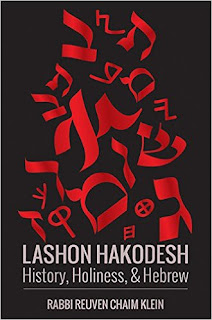Lashon HaKodesh: History, Holiness, & Hebrew
Rabbi Reuven Chaim Klein
Mosaica Press / 320
pages
Rabbi Reuven
Klein’s Lashon Hakodesh is an outstanding work that traces the history
of the Hebrew language, and by extension, the many languages that Jews have
used over the centuries. In addition to Hebrew, much attention is given to
Aramaic, including discussions on the many prayers that are recited in Aramaic.
The book is replete with reference to the entire body of Torah literature, such
as Tanach, Talmud, rishonim, achronim, midrashim, along
with halachic material where relevant. History, archaeology, and other sciences
also make an appearance where relevant. At the end of every chapter is a
summary of that chapter.
The book opens
with a discussion on the earliest languages. We learn that Adam and Eve spoke
Hebrew and Aramaic, followed by additional languages in the time of Noach and
the Tower of Babel. Many important issues in the history of language and the
Jewish people are addressed. For example, are Aramaic and Hebrew related? What
about modern day ivrit and lashon hakodesh? What did the Jews
speak in Egypt? How did God communicate with Moshe, Aaron, and Pharaoh? What
did the Jews speak during the Temple periods? Why is Hebrew called lashon hakodesh?
The list of topics that are dealt with in the book goes on and on.
The chapter on Modern
Hebrew (ivrit) is an especially exciting chapter. We learn about Eliezer
ben Yehuda’s attempts to revive Hebrew as the national language along with ultra-orthodox
opposition to the idea. Nevertheless, I feel that in this chapter, the author
slips slightly from the polished objectivity and scholarship that is characteristic
of the rest of the book. The allegiance to the chareidi narrative on ivrit
is a little too obvious. Rabbi Klein essentially preaches the position of the
likes of Rabbi Yoel Teitelbaum and Rabbi Yosef Chaim Sonnenfeld, along with
other hard liners who argue that modern day ivrit has none of the
holiness of lashon hakodesh. Although some alternative positions are cited,
the bias is clear. Also missing are some of the more “moderate” chareidi
positions on the matter, such as the Rebbes of Ger who have encouraged the
switch from the Yiddish of Europe to ivrit in Israel.
Unlike Rabbi
Klein, I take the position that modern day ivrit is a sanctified
language and is essentially synonymous with “lashon hakodesh.” Indeed,
the State of Israel has had a full time government agency since its creation
whose entire purpose is to find similarities to Scriptural precedents when introducing
new ivrit words to the vocabulary. Yes, the vast majority of the secular
Jewish state’s language is intentionally based on Scriptural lashon hakodesh!
Sure, there are plenty of words in ivrit that are as far from lashon
hakodesh as humanly possible, such as “internet,” “magniv,” and “walla,”
but even lashon hakodesh has been tainted with foreign words such as “Sanhedrin,”
“Gematria,” “Afikoman,” “Totafot,” and others, as Rabbi Klein himself discusses
at length in Chapter 7.
Furthermore, our
sages teach us that even speaking languages that resemble lashon
hakodesh, such as Aramaic and Arabic, has much merit.[1] The Rambam writes that one
should be exceptionally careful with the mitzva of learning and speaking
Hebrew.[2] In
fact, a number of authorities emphasize that one should be sure to teach one's
children Hebrew and to value it above the local vernacular language.[3] We
are told that one should make an effort to at least speak Hebrew on Shabbat.[5] In
fact, it is often permitted to read secular materials on Shabbat if they are
written in Hebrew owing to the holiness of the Hebrew language![6] Hebrew
should be used when speaking about even the most secular of topics.[7]
Although Hebrew may even be spoken in the bathroom,[8] some authorities suggest not
doing so out of respect for its holiness.[9] We are taught that one who
makes the effort to speak Hebrew as much as possible is assured a special place
in the World to Come.[10]
Yiddish, Ladino,
and even Aramaic[11] are
not Jewish languages! They are languages that were created and used by specific
groups of Jews, in specific geographical areas, at specific times
in history. For example, since the Talmud was written in Babylonia, where the Jews
spoke Aramaic, it was written in that language. If the Talmud would have been
written in England, it would likely have been written in English. Hebrew,
especially modern day ivrit, is the only national Jewish language that we
have. In fact, we are taught that in the Messianic era, Hebrew will become the
spoken language of the entire world.[12]
Back to Lashon Hakodesh.
Make no mistake, although I have what to rant about on the chareidi view
of my language (and my army and my country!), the book as a whole is exceptionally
well done. It is impressively researched and full of fascinating information. It
is a one-stop-shop covering everything and anything most people will ever need
to know about the Hebrew language. It is one of the few works reviewed here
that have my highest recommendations.
To order the
book: http://www.amazon.com/dp/1937887545/ref=as_li_ss_tl?ie=UTF8&linkCode=sl1&tag=2256477gfh-20&linkId=0a621a79c26ec4221d5a0fa991572ef8
[1]
Maharsha, Shabbat 77b; Shu"t Harama 127-130.
[2]
Rambam, Pirush Hamishnayot, Avot 2:1.
[3]
Kav Hayashar 2.
[5]
Kaf Hachaim (Palagi) 29:6.
[6]
Tosfot, Shabbat 116b; Rema, OC 307:16.
[7]
OC 85:2.
[8]
Sheilat Yaavetz 1:10, Tashbetz 1:5
[9]
Sefer Chassidim 994.
[10]
Yerushalmi Shabbat 1:3, 9.
[11]
It is interesting to note that angels in Heaven don’t understand Aramaic;
Tosafot, Shabbat 12b. Some say that Aramaic is actually a corrupted form of Hebrew;
Rosh, Berachot 2:2.
[12]
Ibn Ezra to Devarim 6:3; Radak to Tzefania 3:9.

